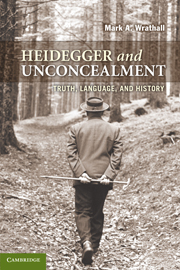Book contents
- Frontmatter
- Contents
- Acknowledgments
- Credits
- Introduction
- Part I Truth and Disclosure
- Part II Language
- Part III Historical Worlds
- 8 Philosophers, Thinkers, and Heidegger’s Place in the History of Being
- 9 Between the Earth and the Sky: Heidegger on Life After the Death of God
- 10 Nietzsche and the Metaphysics of Truth
- Works by Heidegger
- Index
- References
8 - Philosophers, Thinkers, and Heidegger’s Place in the History of Being
Published online by Cambridge University Press: 05 June 2012
- Frontmatter
- Contents
- Acknowledgments
- Credits
- Introduction
- Part I Truth and Disclosure
- Part II Language
- Part III Historical Worlds
- 8 Philosophers, Thinkers, and Heidegger’s Place in the History of Being
- 9 Between the Earth and the Sky: Heidegger on Life After the Death of God
- 10 Nietzsche and the Metaphysics of Truth
- Works by Heidegger
- Index
- References
Summary
The End of Philosophy
The response to Heidegger in the analytical world is, to a considerable degree, a paraphrase of Rudolf Carnap’s 1932 essay “Überwindung der Metaphysik durch Logische Analyse der Sprache.” To the extent Heidegger intends to make philosophical claims with assertions like “the nothing nothings,” Carnap charges, his writings are utterly meaningless; to the extent that Heidegger is creating art, he does it poorly. Or, more likely, Heidegger’s work, like that of all metaphysicians, confounds art and philosophy:
Metaphysicians are musicians without musical ability. Instead they have a strong inclination to work within the medium of the theoretical, to connect concepts and thoughts. Now, instead of activating, on the one hand, this inclination in the domain of science, and satisfying, on the other hand, the need for expression in art, the metaphysician confuses the two and produces a structure which achieves nothing for knowledge and something inadequate for the expression of attitude.
To respond to such charges with a defense of the meaningfulness of Heidegger’s claims about “the nothing” would, however, miss the deeper point. Carnap’s analysis of Heidegger’s alleged “pseudosentences” is really ancillary to the project of rehabilitating philosophy as a discipline – a project driven by Carnap’s view of language. For Carnap, assertions are meaningless unless they have empirical content. And if they have that, they belong properly to the empirical sciences. Thus, for Carnap and many others in the analytical tradition, philosophy (at least, when properly done) has no substantive content; instead, it is “only a method: the method of logical analysis.”
This narrow view of philosophy – philosophy as a method of analysis – is grounded in a profound skepticism regarding our ability to discover truths about ourselves and our world through reason alone. Thus even analytical philosophers like Dummett – philosophers who “no longer regard the traditional questions of philosophy as pseudoquestions to which no meaningful answer can be given” – believe that “philosophy can take us no further than enabling us to command a clear view of the concepts by means of which we think about the world, and, by so doing, to attain a firmer grasp of the way we represent the world in our thought.” Philosophy, the analytical philosopher concludes, ought to abandon metaphysics (thereby leaving the empirical sciences in charge of the pursuit of substantive knowledge) and restrict itself to conceptual analysis.
- Type
- Chapter
- Information
- Heidegger and UnconcealmentTruth, Language, and History, pp. 177 - 194Publisher: Cambridge University PressPrint publication year: 2010



